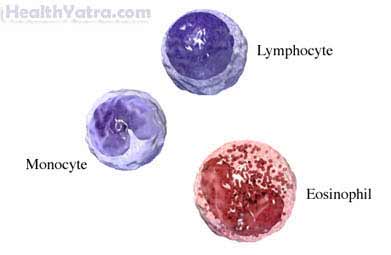Definition
Agranulocytosis is a very low level of white blood cells. These blood cells are part of the immune system. They help fight infections.
Agranulocytosis may be:
Acquired—develops after medical treatment or specific drugs. May appear suddenly or develop over time.
Congenital—present at birth
Cyclic neutropenia—cyles up and down over 21 day period
Severe congenital neutropenia

Causes
Agranulocytosis is caused by destruction of white blood cells or by the failure of bone marrow to make enough white blood cells.
With congenital agranulocytosis, these problems are caused by a genetic defect.
With acquired agranulocytosis, these problems may be caused by:
- Infections—caused by virus, bacteria or parasite
- Underlying inflammatory condition
- Chemotherapy
- Drugs—used in medical treatment or recreational use
- Autoimmune disease—your immune systems attacks your own tissue such as white blood cells
- Illnesses or damage to bone marrow
- Certain toxins
- Poor nutrition—particularly low protein intake
Risk Factors
Factors that increase your chance of developing agranulocytosis include:
- Undergoing chemotherapy treatment for cancer
- Taking certain medications—including some antithyroid medication, antidepressants, antihistamines, anticonvulsants
- Infection
- Exposure to certain chemical toxins or radiation
- Autoimmune diseases
- Enlargement of the spleen
- Vitamin B-12 or folate deficiency
- Leukemia or myelodysplastic syndromes
- Aplastic anemia or other diseases of the bone marrow
- Family history of certain genetic diseases
Symptoms
If you have any of these symptoms do not assume it is due to agranulocytosis. These symptoms may be caused by other, less serious health conditions.
There are often no symptoms until you have an infection. Symptoms of agranulocytosis may include:
- Rapid onset of fever, chills, jaundice, weakness, or sore throat
- Ulcers in the mouth
- Bleeding gums
- Infections, including certain fungal infection (these types of infections are often only present in people with compromised immune systems)
Symptoms of congenital agranulocytosis may include:
- Severe recurrent bacterial infections
- Mild infections of skin, mouth, and nose
- Failure to thrive—with persitent agranulocytosis
Diagnosis
Your doctor will ask about your symptoms and medical history. You will be asked about recent infections, medical treatments, and medications. A physical exam will be done.
Blood tests may be done to diagnose agranulocytosis. The tests will include:
- White blood cell count
- Antineutrophil antibodies—for people with autoimmune disease
- Genetic tests may be needed in some people
To help determine a cause your doctor may also order:
- Bone marrow test
- Urine or other fluid tests—to look for infectious agents
Treatment
Treatment will be based on the type and cause of agranulocytosis that you have. Options include the following:
Leukocyte Transfusion
Leukocytes are a type of white blood cell. These cells are collected from a donor and carefully screened. They are then delivered through an IV. These white blood cells may make up for the deficit caused by agranulocytosis in some.
Medication for Infections Treatment
Anitviral, antibiotic, and antifungal medication may be needed to:
- Treat infection that could be causing agranulocytosis.
- Treat an infection that resulted from agranulocytosis.
- Prevent an infection in people at high risk. This may include people with cancer or immune disorders.
White Blood Cell-stimulating Factors
Granulocyte colony-stimulating factor (G-CSF) or granulocyte-macrophage colony-stimulating factor (GM-CSF) encourage the body to make more white blood cells. This may help with certain types of agranulocytosis.
Remove Causative Agent
When possible the toxin or drug that is causing the problems will be removed.
Prevention
Your doctor will monitor you if you are taking medication or having medical treatment that could lead to agranulocytosis. You may be given a white blood cell stimulating medications before having these other treatments. This may prevent agranulocytosis for some.
Agranulocytosis Treatment in India – Page Keywords:
Agranulocytosis Definition, Agranulocytosis Definition Causes, Agranulocytosis Symptoms, Agranulocytosis Treatment in India, Agranulocytosis Treatment Cost in India, Agranulocytosis Surgery Cost, Top Agranulocytosis Treatment Hospital, Top Agranulocytosis Treatment Doctor in India, Agranulocytosis Meaning in Marathi, Agranulocytosis Treatment Near me, Agranulocytosis Complications, Travel India for Agranulocytosis Treatment, Agranulocytosis Treatment in Arab Countries, Agranulocytosis Treatment in Bangladesh, Agranulocytosis Treatment in Dhaka, Agranulocytosis Meaning in Bengali, Agranulocytosis Meaning in Arabic, Agranulocytosis Meaning in Hindi, Agranulocytosis Treatment in Bahrain, Agranulocytosis Treatment in Egypt, Agranulocytosis Treatment in Iraq, Agranulocytosis Treatment in Jordan, Agranulocytosis Treatment in Kuwait, Agranulocytosis Treatment in Lebanon, Agranulocytosis Treatment in Saudi Arabia, Agranulocytosis Treatment in United Arab Emirates, Agranulocytosis Treatment in Sudan, Agranulocytosis Treatment in Tunisia, Agranulocytosis Treatment in Nepal, Agranulocytosis Treatment cost,
Agranulocytosis Treatment Cost in India, Agranulocytosis Top Doctors Best Hospital in India
